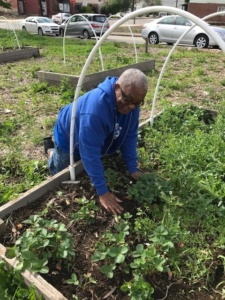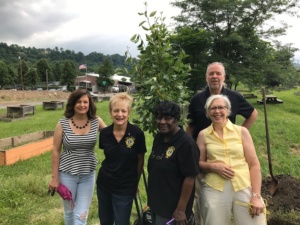Community gardener Masoud Sayles is no stranger to the complex processes of land protection. Sayles and other members of the McKeesport Community Garden have been forced to move their garden site three times since its inception in 2012. The group had an agreement with the city to maintain their initial site as a community garden, tended to the garden there for approximately five years, and “had felt generally comfortable there,” Sayles said. However, at a planning meeting at the start of the 2018 growing season, the mayor came to announce that, due to development pressure, they would have to find another site. And so began the group’s search for other locations to host the garden. Alongside the mayor, they found a second site and began to move materials there only for nearby residents to petition the city not to allow the garden to be erected there. Sayles and the other gardeners have since found a third site but the circumstances up until this point make them wary of its long term stability. “In each case, we’ve moved the garden to a site the city didn’t have the desire to maintain at that point in time,” Sayles explains. “Where we’re at now is partially under PennDOT’s control. In a year, are they going to tell us we have to move again?”

Masoud, far left, with community members at the McKeesport Community Garden’s original site
That’s where Three Rivers Agricultural Land Initiative (TRALI) comes in. A joint venture agreement between Grow Pittsburgh and Allegheny Land Trust (ALT), TRALI supports the major functions of acquiring and supporting land and projects for long-term agricultural use. Coincidentally, Sayles became a member of the TRALI steering committee at the end of 2017 prior to the unfolding of events in McKeesport. “At the time that I joined TRALI, the process was quite abstract to me and has since become very real,” he says. In 2018, the McKeesport Community Garden applied to TRALI, beginning the process of permanent protection for their garden site.
So how does TRALI work in practice? Interested community agricultural projects, such as the McKeesport Community Garden, apply to TRALI by filling out an online application. The TRALI committee then reviews applications and conducts site visits. If the committee recommends the property to be protected long term, ALT provides the technical assistance to more thoroughly assess the property and hopefully acquire it, provided there is a willing seller. Alternately, ALT may place a conservation easement on the property to ensure it cannot be developed while allowing the current owner to continue to hold title.

Community gardener Bill works in a bed at the garden’s original site.
When a community agricultural project becomes protected through TRALI, it ensures the land will remain an agricultural project in perpetuity, removing any possibility of development by other owners, whether public or private. Allegheny Land Trust acquires ownership of a TRALI project property and leases the land to Grow Pittsburgh who then enter into a sub-lease agreement or memorandum of understanding with a community garden group to use the property for its intended agricultural purposes. While ALT would own the property, the respective community group is responsible for the maintenance and upkeep of the space. ALT ownership means that the property can never be developed for any purpose other than agriculture and Grow Pittsburgh’s partnership ensures there is support for garden groups long term. Even if a community group becomes unable to care for a TRALI conserved property in a gardening capacity, the land will always remain a green space safeguarded from development.

Members from the garden at the third and current site.
The McKeesport Community Garden, at its third and present space, is currently in its first year of Grow Pittsburgh’s two-year community garden program. Typically this program starts new community gardens, though there is also precedent for revamping, expanding or restarting established gardens. After the garden’s graduation from the program, the TRALI committee will reassess the group’s capacity and explore options regarding permanent protection of the site. Sayles is optimistic and hopes that the events at the McKeesport garden will help others understand the importance of agricultural land preservation in their own communities. “There are well proven ties between the prevalence and quality of green space in a particular locality and the mental, physical, and emotional well-being of the people living in that area,” he says. “TRALI directly impacts the quality of your community today and for years to come.”
